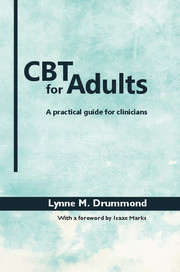Book contents
- Frontmatter
- Dedication
- Contents
- List of tables, boxes, figures and case examples
- Foreword
- Preface
- Structure of the book
- List of abbreviations
- 1 Introduction
- 2 Assessment
- 3 Rules of reinforcement and practical examples
- 4 Social skills training
- 5 Relationship, communication and sexual skills training
- 6 Phobic and social anxiety
- 7 Treatment of obsessive–compulsive disorders
- 8 Depression
- 9 Generalised anxiety disorder and panic
- 10 Body dysmorphic disorder and the somatic symptom and related disorders
- 11 Eating disorders
- 12 Addictive behaviour
- 13 Schizophrenia and the psychoses
- 14 Personality disorder
- 15 CBT in combination with other therapy
- Glossary
- Index
14 - Personality disorder
Published online by Cambridge University Press: 01 January 2018
- Frontmatter
- Dedication
- Contents
- List of tables, boxes, figures and case examples
- Foreword
- Preface
- Structure of the book
- List of abbreviations
- 1 Introduction
- 2 Assessment
- 3 Rules of reinforcement and practical examples
- 4 Social skills training
- 5 Relationship, communication and sexual skills training
- 6 Phobic and social anxiety
- 7 Treatment of obsessive–compulsive disorders
- 8 Depression
- 9 Generalised anxiety disorder and panic
- 10 Body dysmorphic disorder and the somatic symptom and related disorders
- 11 Eating disorders
- 12 Addictive behaviour
- 13 Schizophrenia and the psychoses
- 14 Personality disorder
- 15 CBT in combination with other therapy
- Glossary
- Index
Summary
Overview
Patients with a personality disorder use a disproportionate amount of mental health services’ time. Failure to diagnose or understand a patient's personality disorder can lead to wasted trials of therapy. This chapter examines the role of faulty and unhelpful schemata in the development of these problems and how they affect long-term behaviour. Longer-term CBT interventions will be discussed. There will be a description of borderline personality disorder and the impact this has on mental health services. The application of dialectical behaviour therapy for borderline personality disorder will be demonstrated. How these treatments can be practised within mental health services will be examined. Finally, there will be a discussion about research on these approaches.
Cognitive theories relating to personality disorder
Personality disorder refers to enduring character traits and maladaptive behaviours which are egosyntonic and accepted by the patient as part of their personality. Cognitive treatments are longer-term treatments than those generally applied to conditions such as depression, anxiety and OCD and are aimed at modifying the underlying fundamental beliefs of the individual which are causing problems.
In Chapters 8 and 9, the basic principles of cognitive therapy were described. The basic triad was explored whereby our interactions with the environment and other people lead to certain beliefs about self, others and the world. These beliefs vary in accuracy and functionality and are fundamental, usually not articulated and accepted as ‘absolute truths’ Beck (1995). Cognitions (verbal or pictorial) are based on attitudes or assumptions (schematas), which develop from previous experiences (Beck, 1967, 1979). Another term used to describe schemata is core beliefs. The evidence of these schemata are the NATs that arise from underlying assumptions that in turn are ‘rules’ which are a product of these schemata.
The schemata are thus patterns of beliefs which are developed in early life in an attempt to make sense of the world and the environment. They are not logical but are held with complete conviction as absolute truths. The hierarchy of these thoughts is shown in Fig. 14.1.
- Type
- Chapter
- Information
- CBT for AdultsA Practical Guide for Clinicians, pp. 219 - 231Publisher: Royal College of PsychiatristsPrint publication year: 2014



